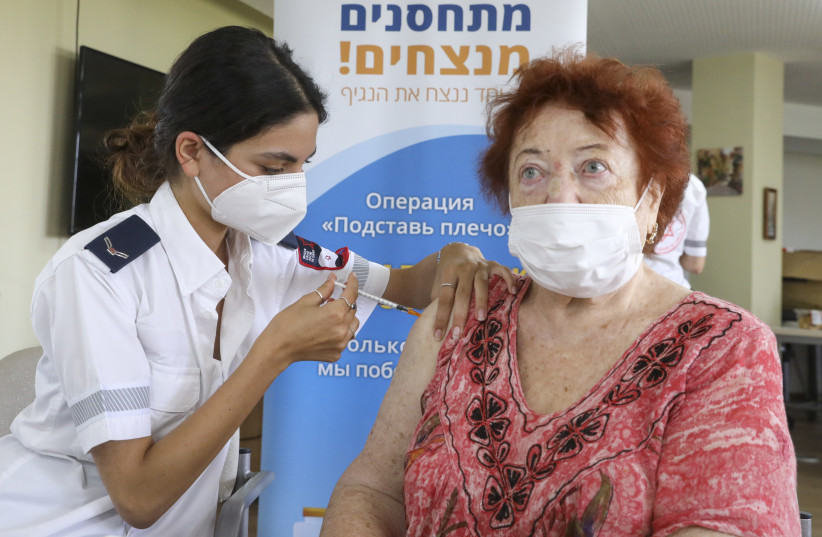The rate of confirmed infections was 10 times (11.3) lower than in those who did not receive a booster. The rate of severe infection was about 20 times (19.5) lower.
cnxps.cmd.push(function () { cnxps({ playerId: ’36af7c51-0caf-4741-9824-2c941fc6c17b’ }).render(‘4c4d856e0e6f4e3d808bbc1715e132f6’); });
if(window.location.pathname.indexOf(“656089”) != -1){document.getElementsByClassName(“divConnatix”)[0].style.display =”none”;}else if(window.location.pathname.indexOf(“/israel-news/”) != -1){ document.getElementsByClassName(“divConnatix”)[0].style.display = “none”; var script = document.createElement(‘script’); script.src=”https://player.anyclip.com/anyclip-widget/lre-widget/prod/v1/src/lre.js”; script.setAttribute(‘pubname’, ‘jpostcom’); script.setAttribute(‘widgetName’, ‘0011r00001lcD1i_12258’); document.getElementsByClassName(‘divAnyClip’)[0].appendChild(script);}else if(window.location.pathname.indexOf(“/health-and-wellness/”) != -1){ document.getElementsByClassName(“divConnatix”)[0].style.display = “none”; var script = document.createElement(‘script’); script.src=”https://player.anyclip.com/anyclip-widget/lre-widget/prod/v1/src/lre.js”; script.setAttribute(‘pubname’, ‘jpostcom’); script.setAttribute(‘widgetName’, ‘0011r00001lcD1i_12246’); document.getElementsByClassName(‘divAnyClip’)[0].appendChild(script);}
Biden and the Centers for Disease Control and Prevention (CDC) announced a plan on August 18 — about two and a half weeks after Israel opened booster shots to adults over the age of 60 — to begin offering 20-week booster shots. September. Israel’s decision was based on research showing that vaccine-induced immunity declines significantly about five months after the second shot.
Dr. Sharon Alroy-Preis is due to present the Israeli research to the FDA on Friday.
Israel opened boosters to everyone over the age of 12 in late August. So far, about 3 million Israelis have been caught with a third shot. On an average 10,000 new cases are being reported daily in the country. However, 65% of all serious infections in the country involve uninfected people and about 90% are those associated with extracorporeal membrane oxygenation (ECMO) machines.
Boosters will be available in the US eight months after a person’s second dose of either Pfizer or Moderna, Biden announced.
But proceeding with booster shots was always subject to the FDA conducting an independent evaluation and determination of the safety and effectiveness of a third dose in conjunction with the CDC’s Advisory Committee on Immunization Practices.
An essay published in the peer-reviewed Lancet medical journal on Monday by an international group of vaccine experts, however, came out against providing a third dose to the general population. The authors said recent studies suggest the vaccine provides strong protection against viruses, including the delta variant. They recommend giving vaccine manufacturers time to modify the vaccine to match specific or new coronavirus variants rather than providing an additional dose of the original version.
According to a joint release by the authors, the Israeli study makes it “clear that booster vaccination is very effective in reducing the rate of both confirmed infection and severe disease”.
Specifically, the research team divided more than a million eligible Israelis over the age of 60 into two groups: those who had received a booster shot and those who had not. Membership in any group was dynamic; Those who previously belonged to the non-booster group dropped it and joined the booster group 12 days after receiving the booster dose.
 The third vaccine dose is being given by Magen David Edom (MDA), Jerusalem at the Amygdor Retirement Residence, August 5, 2021. (credit: Mark Israel Salem)
The third vaccine dose is being given by Magen David Edom (MDA), Jerusalem at the Amygdor Retirement Residence, August 5, 2021. (credit: Mark Israel Salem)
Overall, some 4,439 new confirmed cases of COVID-19 and 294 cases of severe illness were reported in the non-booster cohort, while there were only 934 new cases and 29 critically ill persons in the booster cohort.
A release on the study said, “Twelve days or more after the booster dose was given, the rate of confirmed infections and cases of severe disease was ten times lower in the booster cohort than in the non-booster cohort. ” “An additional, more conservative analysis that aimed to neutralize potential behavioral differences between the two groups revealed that the booster cohort had a five-fold lower rate of confirmed infections.”
According to other studies conducted in Israel, people vaccinated with two doses more than six months ago are only half as likely to have the virus. This study showed that people who get a booster dose have only a 5% chance of getting sick. In other words, the vaccine efficacy for individuals receiving the third dose of the Pfizer vaccine is about 95%—similar to the “fresh” vaccine efficacy reported against the original Wuhan strain.
However, the researchers cautioned in the journal article that “in terms of real-world effectiveness, such an effect size is unclear.”
The study was a collaboration of researchers from the Ministry of Health, the Weizmann Institute of Science, the Technion – Israel Institute of Technology, the Hebrew University of Jerusalem, the Gartner Institute at Sheba Medical Center, and the KI Research Institute.
The team said future studies should determine the long-term efficacy of booster doses against the delta variant and other possible future forms of anxiety.